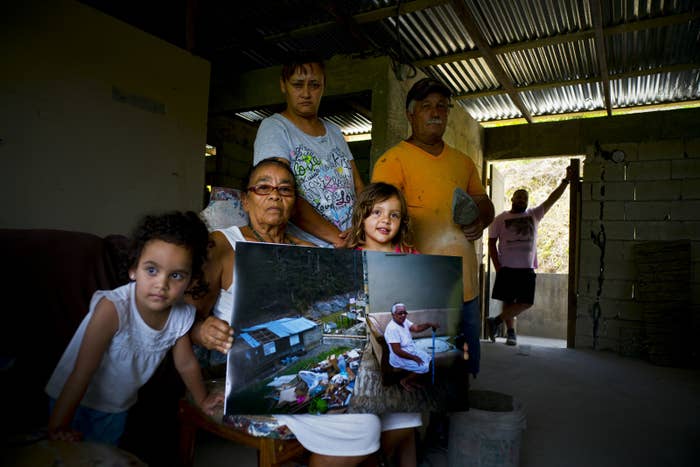
WASHINGTON — The Trump administration says providing additional disaster funding for Puerto Rico’s food stamp program is “excessive and unnecessary,” as the island continues to struggle to recover from the effects of 2017's Hurricane Maria and an ongoing economic crisis.
In response to a bill that passed the House this week, the White House rejected the idea of extending disaster funding for food stamps in Puerto Rico in a statement on Wednesday. The measure would have provided $600 million for the island’s food stamp program, known as NAP or Nutrition Assistance for Puerto Rico, to help provide for more Puerto Ricans in the aftermath of the natural disaster.
“There is no indication that households need ongoing support at this time or that Puerto Rico requires additional time to return to normal NAP operations,” the White House wrote in the statement of administration policy.
But the request for $600 million came directly from Puerto Rico Gov. Ricardo Rosselló, who wrote a letter to congressional leaders in November asking for additional disaster relief funding, including for the food stamp program, citing “its inability to provide food security to those in need.”
“For the last three and half decades the U.S. Congress has treated American citizens in Puerto Rico differently when it comes to meeting essential nutritional needs,” he wrote at the time.
Rosselló said the program was inadequate to meet Puerto Rico's needs to begin with, but now, after an unprecedented natural disaster and financial crisis, the emergency funds are crucial.
In a statement Thursday, following the White House's letter, Rosselló pleaded with Trump to meet with him "so I can correct the ill-informed advice and disconcerting notions you are getting on Puerto Rico, particularly on the NAP program which provides much needed nutritional assistance to over 1 million US citizens living in Puerto Rico."
The food stamp funding was part of a larger bill passed by the House this week, which would have reopened the government through the end of September. The bill is unlikely to make it to President Donald Trump’s desk at all; Senate Majority Leader Mitch McConnell has said he will not take up any bills that the president won’t sign.
After Hurricane Maria devastated Puerto Rico’s infrastructure, Congress and the White House approved an additional $1.27 billion for food stamps there. Puerto Rican authorities expect that to run out in March and say the program was already inadequate before the hurricane but would see even more people going hungry now. The program provided for around 100,000 additional families through the initial disaster relief funding.
Puerto Rico’s food stamp program has worked differently than the Supplemental Nutrition Assistance Program in the rest of the US since Congress removed the island from the national food stamp program in 1982. NAP is treated as a limited-amount block grant and is usually funded at lower levels than states receive for SNAP benefits. It gets a capped amount of roughly $2 billion per year, which has remained mostly flat since the 1990s.
As it’s funded at lower levels than SNAP in the states, the food stamp program in Puerto Rico has a lower poverty threshold, meaning that it is not available to thousands of families who would likely qualify for SNAP in the rest of the US. According to Census Bureau data, Puerto Rico’s poverty rate was 44%, compared to 12.3% nationally — and that’s according to the latest data from 2017, before Hurricane Maria was taken into account.
Rosselló wrote that NAP “leaves many families in need without the food security that they would have living in the states.”
“This is a program that aids some of the most vulnerable who have already suffered immensely because of the Trump Administration’s bumbled and ineffective response to Hurricanes Maria and Irma,” New York Rep. Nydia Velázquez, who authored the amendment adding NAP funds to the House bill, said in a statement on Thursday.
NAP funds for Puerto Rico, like SNAP for the rest of the country, are provided through the USDA, which has been shut down for nearly a month. The agency has used a provision in the funding bill that expired in December to provide SNAP benefits through February.
A USDA spokesperson confirmed to BuzzFeed News that NAP, and similar block grants to the Northern Mariana Islands and American Samoa, are included in that move and will receive food stamp funds to cover February.
"USDA will provide Puerto Rico’s February funds prior to January 20, and the commonwealth can distribute the funds according to their normal procedures," the USDA spokesperson said in a statement.

